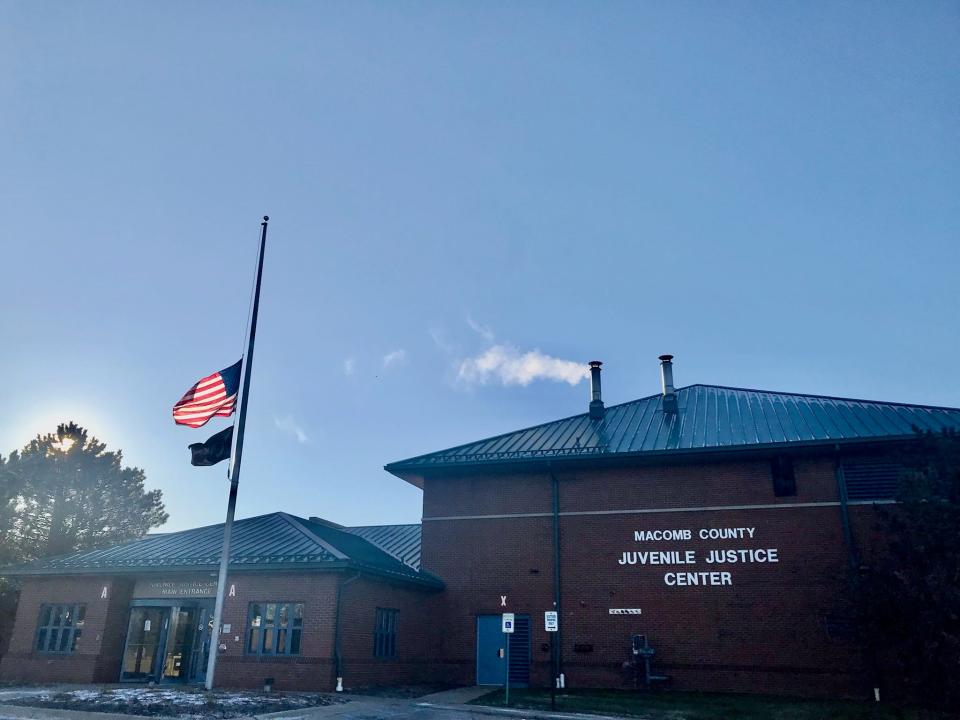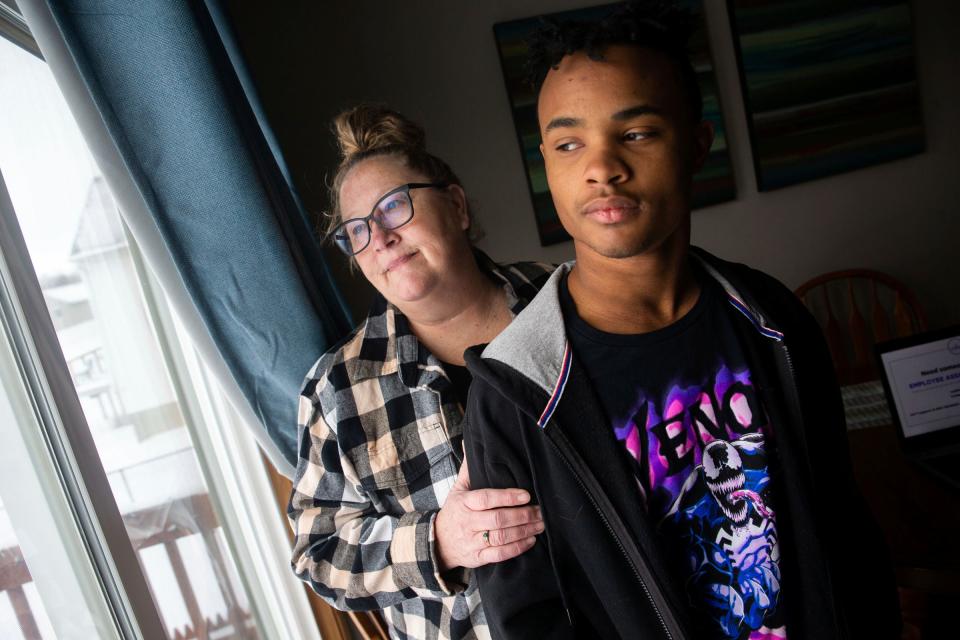Michigan secures more beds for justice-involved youth, works to get more treatment options
Michigan has opened nearly 100 additional beds for youths in the juvenile justice system who need residential placement, one of several efforts the state is making to address the need for more treatment options for youths.
The majority of the placements — 60 of the nearly 100 — are in Wayne County and will relieve crowding within the Wayne County Juvenile Detention Facility.
Another 20 are in the new St. Clair Youth Treatment Center, which is within but separate from the detention side of the Macomb County Juvenile Justice Center in Mount Clemens. That new program is focused on helping Wayne County, but ultimately could take youths from across the state.
Youth justice advocates say the availability of space within the Macomb County facility is a testament to the county's efforts to reduce juvenile incarceration — an approach to juvenile justice that, thanks to recent legislation, will likely become a statewide priority.

"There remains a waitlist for children who need treatment in residential facilities, and obviously we continue to work every single day on finding more residential placements," said Suzanna Shkreli, director of juvenile justice reform for the Michigan Department of Health and Human Services. "That's while we work toward keeping more youth in their communities so that they don't require secure treatment."
Juvenile justice reforms should reduce need for placements
The expansion of placement options comes as Michigan works to reform its approach to juvenile justice statewide. A recent package of bills passed in the Legislature took aim at the reliance on detention, setting the foundation for more juveniles to be diverted into community-based programs.
The bills include changes in the way state money can be used for diversion and emergency placements, and require risk and needs assessments to be conducted throughout a child’s justice involvement, starting immediately. These tools would help identify community-based services that might help them avoid or step down from a residential placement or detention.
Meanwhile, Shkreli said courts continue to order juveniles into secure facilities every day.
Since March, MDHHS said it secured new juvenile justice placements beyond the Macomb County spots, including:
12 at Highfields Inc., headquartered in Ingham County.
Three at Holy Cross Children's Services in Saginaw.
Two provided by Bethany Christian Services in Grand Rapids.
40 at Spectrum Human Services in Highland Park.
20 at Team Wellness Center at Eastern Market in Detroit, which operates a day treatment program for juvenile justice-involved youths.
Spots at St. Clair Youth Treatment Center, five of which have been filled since opening Nov. 20 with youths from Wayne County, will be reserved for youths who previously were being held in the Wayne County Juvenile Detention Facility.
The Wayne County facility has come under scrutiny for its dangerous conditions, including overcrowding. The Free Press reported in October that two children may have been sexually assaulted during their stay there, and another was beaten so badly by a staff member that he required hospitalization. A host of licensing investigations are currently open; state officials took corrective action just over a month ago, and the facility has a state monitor present around the clock.
More: Problems we found at the Wayne County juvenile jail
A focus on rehabilitation
The St. Clair Youth Treatment Center is for boys ages 13 to 18 who have a history of delinquent behavior and mental health, substance use disorder and/or other behavioral needs.
Nevada-based Rite of Passage won the contract to run the facility, where justice-involved youths will have the opportunity to continue their schooling and receive mental health treatment and family and group therapy as well as job or vocational training.
The center features single rooms and employs locally hired staff, said Ray Moss, program director. Staff-to-youth ratio is to be 1-to-4 during the day and 1-to-8 at night. Moss said the center allows families to visit at least nine times a month in addition to family therapy.
"We encourage, and we really want, a lot of family interaction with the kids," he said, adding if a family member is indigent or doesn't have transportation, the center, for example, can provide an Uber for them to get to the facility.
Youth generally will stay for nine months to a year before being released, Moss said, and continue to receive follow-up care for at least a year, either through the program or available community programs.
"We want to be part of the ecosystem that the state of Michigan is trying to create, off-ramps out of home placement ... to create better outcomes for youth," Moss said.

A best-practice intervention with a big price tag
MDHHS Director Elizabeth Hertel said her department did its due diligence before selecting Rite of Passage to run the new facility in Macomb County, the group's first residential program in Michigan. State officials met with officials from courts that had remanded children to Rite of Passage care at other centers and visited a similar program the organization runs in Indiana.
The nonprofit was established in 1984 and operates 55 programs in 16 states for 2,000 youths, according to its website. Problems have been reported at some of the locations, including a criminal sex charge at a Cincinnati-area facility, after which Hamilton County terminated its contract with Rite of Passage.
Input from Michael Dempsey, executive director of the national-level Council of Juvenile Correctional Administrators, assured Michigan decision-makers that Rite of Passage is well above best practice standards and a "go-to provider" for both secure and nonsecure programming.
"Most importantly, they really care about the youth and the work that they do," Shkreli said. "They want to build a compassionate, caring environment, reduce incidents of violence, get the youth the treatment that they need and to build a trauma-informed environment."
But its services come at a high cost.
The daily rate for a boy to be placed at the St. Clair Youth Treatment Center is $875, according to MDHHS. That’s in addition to rent the state must pay Macomb County, and nearly $1 million in grant agreements to pay for facility renovations and startup costs, including onboarding staff.
The state's proposed rental agreement with Macomb County is more than $11,000 a month. The county's Board of Commissioners is to vote later this month on the agreement with MDHHS, as well more than $255,000 in building modifications for which the state is reimbursing the county.
Rite of Passage in 2021 had revenue of over $21 million and expenses $1 million above that.
'We all have a vested interest in helping at-risk youth'
The St. Clair Youth Treatment Center is housed in, but physically separated from, the county's juvenile detention center. The detention side has 20 to 40 boys and girls at any one time from Macomb or other counties, such as St. Clair and Lapeer, which contracts with Macomb County per bed per day as needed. Some youths from Wayne County previously were housed in Macomb County's detention center, said Andrew McKinnon, Macomb County deputy executive.
Macomb County Executive Mark Hackel said courts have been good about finding options other than confinement for youths and that "confinement should never be a substitute for treatment."
He said he has had conversations with state officials, including Gov. Gretchen Whitmer and Hertel, and others in the area of juvenile justice. He said he would like to come up with ideas, maybe a regional approach, on what he called "incredible challenges" with administrative rules and legislation that is hindering the ability to manage youths who are violent or turning violent toward other youths or staff.
Conversations about managing youths' behavior, as well as discussions about a $230 million project for the Macomb County Jail that includes a central intake center with services for adults brought in with mental health and substance abuse issues, were part of the reason state officials turned to Macomb County to house the new St. Clair Youth Treatment Center, county leaders said.
State lawmakers approved $40 million for the jail project, helping the county. Now, the county is helping the state with space for the new youth treatment center.
"We want to be a good regional and state partner," McKinnon said, adding he hopes the youths in the new center "have good outcomes and treatment and hopefully, they'll be successful."
"I think we all have a vested interest in helping at-risk youth," he said.
A 'once in a generation' chance for reform
Shkreli said MDHHS will continue to work with courts to get the best data possible about the true need for residential placements. In the meantime, the department will continue to look for additional placement options including those that would be open to girls.
MDHHS has also requested a grant from the federal Office of Juvenile Justice and Delinquency Prevention that would fund the department to assess and plan community-based services across the state to understand where there are gaps. Hertel said she's keeping her fingers crossed that the state gets the grant, and also receives further funding to actually build out needed community services.
Hertel said she is excited for the "once in a generation" chance to reform the juvenile justice system. As her department looks for opportunities to make more placements available, she said she looks forward to the new diversionary tools and funding courts can use to keep more and more children out of them.
Contact Christina Hall: chall@freepress.com. Follow her on X, formerly Twitter: @challreporter.
Jennifer Brookland covers child welfare for the Detroit Free Press in partnership with Report for America. Make a tax-deductible contribution to support her work at bit.ly/freepRFA. Reach her at jbrookland@freepress.com.
This article originally appeared on Detroit Free Press: Michigan works to get more justice-involved youth treatment options

